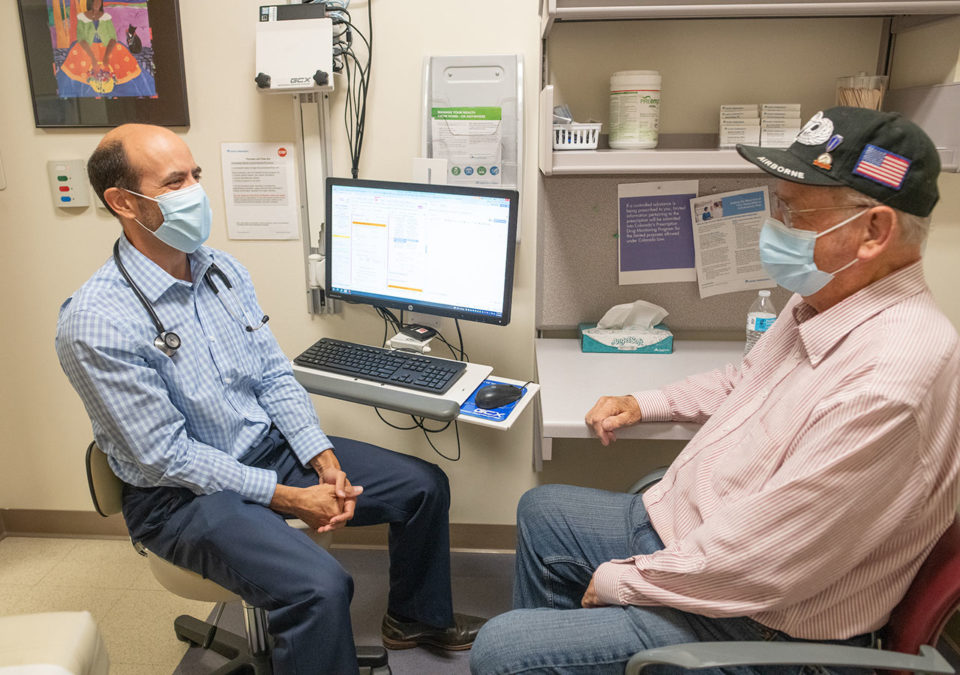
What Cancer Screenings Should I Get and When?
One in 3 people in the United States will develop cancer in their lifetime, according to Cancer Facts and Figures 2022, by the American Cancer Society. Even though everyone is at risk of developing it, the likelihood increases with age: 80% of people diagnosed with cancer in the United States are 55 years of age or older, the report notes. That’s why it’s so important to have a healthy lifestyle and make routine cancer screenings a part of your health care regimen — even if you don’t have a family history of cancer or other risk factors.
Although being nervous or worried about cancer screenings is common, finding it early is critical, because when cancer is detected early, it’s easier to treat, and survival rates are higher. In fact, the average 5-year survival rate for an array of cancers declines from 91% when detected early to 26% when detected late.1 Plus, technological innovations often allow for the removal tumors at earlier stages in sensitive regions of the body.
Here are some things you should know about cancer prevention and screening.
Prevention and lifestyle
One way to help protect yourself from cancer — as well as other serious health conditions such as cardiovascular disease, diabetes, and obesity — is by living a healthy lifestyle. And it’s never too late to start. Here some tips to follow:
- Eat healthy (fruits and vegetables may help prevent many kinds of cancer) and maintain a healthy weight.
- Be physically active — even something as simple as walking for at least 30 minutes a day benefits your health.
- Manage stress through exercise, mindfulness, breathing exercises, meditation, etc.
- Use 30 SPF sunscreen or higher when you go outdoors, and avoid sun exposure between 10 a.m. and 4 p.m. Also, wear protective clothing, such as long-sleeve shirts and wide-brimmed hats. Conduct regular self-exams of your skin and have regular checkups with a dermatologist.
- Don’t drink alcohol, or at least limit your intake to no more than two drinks a day for men and one drink a day for women.
- Avoid all forms of tobacco. If you currently use it, quit as soon as possible — and get help if you have difficulty quitting.
Routine screenings
Everyone should receive the appropriate routine cancer screenings for their age and other factors. People with a family history of cancer can be at increased risk, and some cancer types are more common among certain racial and ethnic groups, so they might need to be screened earlier and more often. If you’re unsure of your risks, talk to your doctor. They should create a personalized screening schedule based on your risk level. At Kaiser Permanente, for example, our electronic health record system automatically reminds doctors when patients are due for cancer screenings based on their personal health histories.
The American Cancer Society offers general guidance for when to begin certain cancer screenings based on age and other factors. Here’s a summary of their recommendations.
25-39 years old
Cervical cancer
40-49 years old
Breast cancer (typically at 45 with the option to start at 40)
Cervical cancer
Colorectal cancer (beginning at 45 for everyone)
Prostate cancer (black men and men who have a father or brother who developed prostate cancer before 65 should discuss beginning routine screenings with their doctor)
50+ years old
Breast cancer
Cervical cancer
Colorectal cancer
Lung cancer (for former or current smokers, per you doctor’s recommendations)
Prostate cancer (all men should discuss prostate cancer screening with their doctor)
Innovative treatment
Detecting cancer early improves the chances for successful treatment. Plus, new and innovative procedures and treatments are being brought to the cancer fight.
Consider the case of Ned Nedbalski, a Kaiser Permanente member. Two years after having a melanoma tumor removed from his head, he slipped and fell on his back in the snow. He went to the emergency room for X-rays to check his back and chest for fractures. There were none, but doctors found a small tumor in one of his lungs. Nedbalski’s doctor, Matthew Eadens, MD, a Kaiser Permanente medical oncologist, brought up Ned’s case in a regular meeting of various cancer and surgical specialists called a “tumor board.” In these meetings, Kaiser Permanente doctors discuss specific cases, share best practices, and map out the best possible treatments for patients. When Kaiser Permanente thoracic surgeon Lanny Dunham, MD, heard Dr. Eadens describe Nedbalski’s case, he suggested an innovative surgical technique to remove Ned’s tumor.
“Here at Kaiser Permanente, we’ve been able to adapt a new technology in order to radically change how we’re approaching lung cancer,” Dr. Dunham said. Doctors can Identify lung nodules that are as small as “the edge of a pencil eraser” and remove them much earlier than ever before. “We were one of the first [providers] in the country to do that with our hospital partners,” Dr. Dunham said. “In Ned’s case, that made a huge difference because he had metastatic melanoma that with traditional methods, we could not have identified, removed, or treated at such an early stage.”
Dr. Eadens also initiated chemotherapy treatment for Ned to eliminate any microscopic cancer too small to be detected. He made a full recovery.
While doctors are bringing innovations to the fight against cancer all the time, you can do your part to prevent it or detect it early with a healthy lifestyle and routine screenings.
About Dr. Matthew Eadens
Matthew Eadens, MD, is a board-certified medical oncologist who joined Kaiser Permanente in 2012. He specializes in treating gastrointestinal, prostate, bladder, kidney, hematologic, skin, breast, lung, brain, and colorectal cancer. He was named a Top Doctor in 2022 by 5280. In his free time, he enjoys outdoor activities with his wife and son, watching sports, and playing the drums.
1 Siegel, Rebecca L., MPH, et al. “Cancer statistics 2018,” CA: A Cancer Journal for Clinicians, January 4, 2018.
